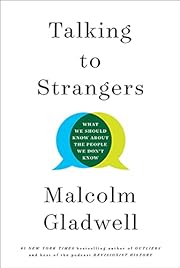

Pulse en una miniatura para ir a Google Books.
|
Cargando... Talking to Strangers: What We Should Know About the People We Don't Knowpor Malcolm Gladwell
 Top Five Books of 2019 (196) » 5 más Actualmente no hay Conversaciones sobre este libro.   ) )There's a lot to like about this book, and [[Malcolm Gladwell]]'s writing in general - you can read the reviews below for yourself. I'll stick to the one quibble I have with Gladwell's conclusions. In a late section in the book, he focuses on a lot of the research around detecting deception, agreeing with the conclusions in that research that law enforcement is not very good at detecting when someone isn't telling them the truth. The problem with the underlying research is that it is almost completely laboratory studies, most which is designed around college students and unrealistic situations. The typical is that a college volunteer is put in front of a computer and told to type but not to ever touch the ESC key. The researchers then confront the volunteer, saying they touched the ESC key. Some volunteers lie, some don't, and others watch five minute videos to determine who is telling the truth. Then, they show the videos to some law enforcement and everyone functions about chance levels. But to extrapolate that a cop, who is used to asking the questions themself, based on evidence and gathered information, in a lengthy interview, is poor at determining deception based on viewing a five minute video is preposterous. Indeed, the research is essentially designed to identify who can guess better, a cop or a college student - anyone remember their college days and tests; it's a lot of guessing. Laboratory researchers have been trying for years to set up a realistic design to test law enforcement's ability to detect deception, but they've always designed extremely poorly. Outside this brief section in the book, it is a wonderful description of how we often get it wrong in interpersonal communication. Highly Recommended, with a caveat!!!! 4 1/2 bones!!!!! I must admit, I had no idea the title of this book would take me to places I really didn't want to go. I think I've been bamboozled. I was expecting and anticipating the thought of learning something new. A skill I could apply everyday. Instead, what the reader gets is a rehash of several criminal cases, a few being somewhat well known, whereby Gladwell attempts to show that preconceived notions of acquaintances and especially strangers cast a bias on what we think about them. Personally, I think it's a flimsy excuse to take quite a few stories and put them in the same basket. It just goes all over the place when perhaps a book dedicated to just a few instances where miscommunication went badly would be more instructive and enlightening. sin reseñas | añadir una reseña
PremiosListas de sobresalientes
C�mo pudo un esp�a pasar a�os sin ser detectado en los m�s altos niveles del Pent�gono? �Qu� llev� a Neville Chamberlain a creer que pod�a confiar en Adolf Hitler? �Qu� tienen en com�n esos casos con el enga�o de Bernie Madoff, el juicio de Amanda Knox, el suicidio de Sylvia Plath o la comedia de televisi�n Friends? Cuando interactuamos con desconocidos, a menudo las cosas no salen bien, en parte porque creemos adivinar las intenciones de los dem�s bas�ndonos en pistas terriblemente endebles.En Hablar con extra�os, Malcolm Gladwell, el autor que ha conquistado a una legi�n de admiradores con su particular manera de ver el mundo, entrevista a toda una serie de personas brillantes, ofrece un arsenal de ejemplos divertidos, contraintuitivos y convincentes, extrae de ellos ideas poderosas y las condimenta con abundantes datos inolvidables. Al mostrarnos por qu� se nos da tan mal leer entre l�neas, revela las claves para lidiar mejor con los desconocidos en nuestra vida.En este nuevo viaje a lo inesperado, Gladwell nos ofrece nuevos y valiosos descubrimientos sobre nosotros mismos, pasados por el prisma de la historia, la psicolog�a y la sociolog�a. No se han encontrado descripciones de biblioteca. |
Debates activosNingunoCubiertas populares
 Google Books — Cargando... Google Books — Cargando...GénerosSistema Decimal Melvil (DDC)302Social sciences Social Sciences; Sociology and anthropology Social InteractionClasificación de la Biblioteca del CongresoValoraciónPromedio: (3.77) (3.77)
¿Eres tú?Conviértete en un Autor de LibraryThing. |
||||||||||||||||||||||||||||||||||||||||||||||||||||||||||||||||||||||||||||||||||||||||||||||||||||||||||||||||||||||||